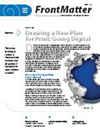Focus Issue: Weaving Together Knowledges—Collaborations in Support of the Wellbeing of Mountain Peoples and Regions
IF 1.8
4区 环境科学与生态学
Q4 ENVIRONMENTAL SCIENCES
引用次数: 0
Abstract
Knowledge collaborations are fundamental for developing effective pathways toward more just and sustainable futures in mountains. Strengthening the resilience and wellbeing of mountain peoples and regions requires that Indigenous and academic ways of knowing contribute meaningfully to informed decisions and interventions at multiple levels. Mountain systems are experiencing increasing threats to their sustainability, including climate change impacts, biodiversity loss, habitat destruction, anthropogenic pressures, and increased vulnerability of local livelihoods. Rapid and disruptive changes to mountain systems also foreshadow impacts on the broader landscape. Indigenous Peoples’ understanding of relationality positions communities and livelihoods as integral parts of mountain systems and emphasizes interconnectedness of all the elements of these systems. However, historically, Indigenous knowledge and methodologies have been devalued and constrained in an institutional and peer-review context defined by academic traditions. Academic disciplines have developed related concepts and approaches intended to investigate and communicate system interconnectivity, including nature’s contribution to people, socioecological systems, and biocultural diversity. Importantly, all of these ways of knowing and doing recognize that people are a key element of mountain systems and that human decisions and actions have unique impacts within them. Innovative models of collaborative knowledge inquiry can enhance our ability to understand and address the impacts of rapid environmental, economic, and social change on the resilience of mountain systems, while empowering, respecting, and, where useful, bringing together Indigenous and academic knowledges and research approaches . This focus issue of MRD was born from a fruitful partnership with the Canadian Mountain Network (CMN). It focuses on knowledge collaborations by mountain researchers and Indigenous Peoples in support of the wellbeing of mountain people and regions. Articles published in this issue provide examples of knowledge coproduction and application in diverse mountain contexts across the globe. Beyond contributing to the recognition of multiple forms of scientific knowledge inquiry, we hope that this issue will inspire more ethical and meaningful cooperation between academics and Indigenous and local mountain communities, with a view to achieving more sustainable futures and redressing historical injustices . Indigenous and local knowledge from the Andes and the Himalayas is presented in the MountainViews section. As a result of an innovative peer-review process that acknowledges place-based forms of knowledge production, the 2 articles published in焦点议题:编织知识——支持山区人民和地区福祉的合作
知识合作是开发通往山区更加公正和可持续未来的有效途径的基础。要加强山区人民和地区的复原力和福祉,就需要土著人和学术界的知情方式对多个层面的知情决策和干预措施做出有意义的贡献。山区系统的可持续性正面临越来越多的威胁,包括气候变化影响、生物多样性丧失、栖息地破坏、人为压力以及当地生计的脆弱性增加。山脉系统的快速和破坏性变化也预示着对更广泛景观的影响。土著人民对关系的理解将社区和生计定位为山区系统的组成部分,并强调这些系统所有要素的相互联系。然而,从历史上看,在学术传统定义的机构和同行评审背景下,土著知识和方法论一直被贬低和限制。学术学科已经开发了相关的概念和方法,旨在调查和交流系统的相互联系,包括自然对人类、社会生态系统和生物文化多样性的贡献。重要的是,所有这些认识和行动的方式都认识到,人是山系的关键要素,人类的决策和行动在山系中具有独特的影响。合作知识调查的创新模式可以提高我们理解和应对快速环境、经济和社会变化对山区系统复原力的影响的能力,同时赋予权力、尊重土著和学术知识以及研究方法,并在有用的情况下将其结合在一起。MRD的这一焦点问题源于与加拿大山地网络(CMN)富有成果的合作关系。它侧重于山区研究人员和土著人民的知识合作,以支持山区人民和地区的福祉。本期发表的文章提供了在全球不同山区背景下共同生产和应用知识的例子。除了有助于承认多种形式的科学知识调查外,我们希望这一问题将激励学术界与土著和当地山区社区之间进行更多合乎道德和有意义的合作,以实现更可持续的未来,纠正历史上的不公正现象。安第斯山脉和喜马拉雅山脉的土著和当地知识见“山景”部分。作为承认基于地点的知识生产形式的创新同行评审过程的结果,发表在
本文章由计算机程序翻译,如有差异,请以英文原文为准。
求助全文
约1分钟内获得全文
求助全文
来源期刊
CiteScore
3.10
自引率
18.80%
发文量
36
审稿时长
4.5 months
期刊介绍:
MRD features three peer-reviewed sections: MountainDevelopment, which contains “Transformation Knowledge,” MountainResearch, which contains “Systems Knowledge,” and MountainAgenda, which contains “Target Knowledge.” In addition, the MountainPlatform section offers International Mountain Society members an opportunity to convey information about their mountain initiatives and priorities; and the MountainMedia section presents reviews of recent publications on mountains and mountain development.
Key research and development fields:
-Society and culture-
Policy, politics, and institutions-
Economy-
Bio- and geophysical environment-
Ecosystems and cycles-
Environmental risks-
Resource and land use-
Energy, infrastructure, and services-
Methods and theories-
Regions

 求助内容:
求助内容: 应助结果提醒方式:
应助结果提醒方式:


